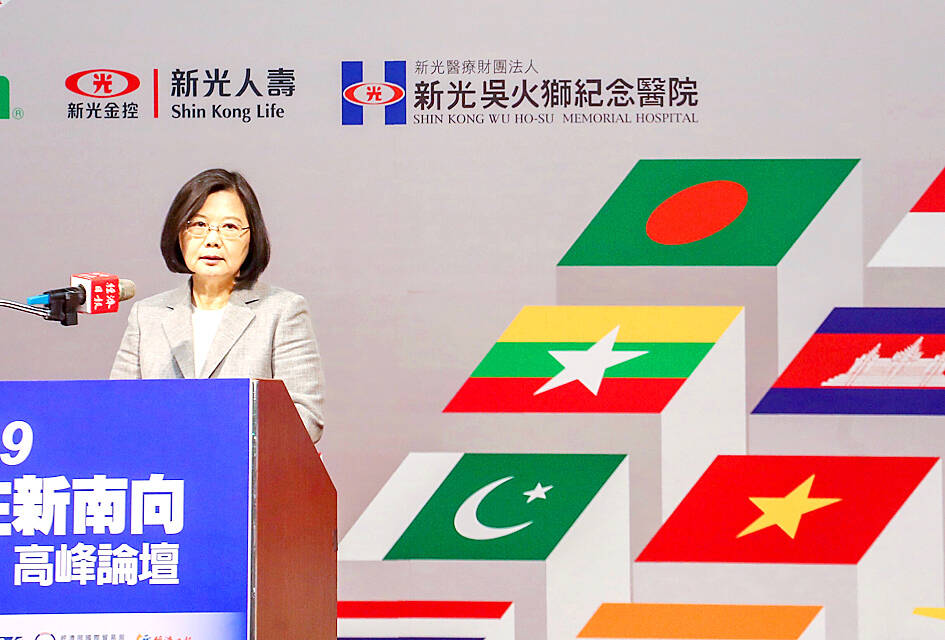The amount of approved outbound investments in countries under the government’s New Southbound Policy (NSP) accounted for more than 50 percent of the nation’s total approved outbound investments last month, the Ministry of Economic Affairs said on Saturday.
The New Southbound Policy aims to enhance trade and exchanges between Taiwan and 18 countries in Southeast and South Asia, as well as Australia and New Zealand, to reduce Taiwan's dependence on China. It was introduced after President Tsai Ing-wen (蔡英文) took office in 2016.
Data released by the ministry’s Department of Investment Review showed that the investments pledged by Taiwanese firms in the countries included in the policy totaled about NT$310 million (US$9.88 million) last month, up 29.97 percent from a year earlier.

Photo: CNA
The funds pledged for the countries made up about 57 percent of the total outbound funds — US$542 million — approved by the ministry last month.
Among the NSP countries, Vietnam, Thailand and Malaysia were the top three destinations for Taiwanese investors, the ministry said.
Last month, funds pledged for the Thai market jumped 243 percent from a year earlier to NT$49 million on the back of a large single investment plan worth NT$45 million, it said.
In contrast, approved investments bound for China fell 66.3 percent from a year earlier to US$95.61 million last month, it added.
The ministry said the support service industry in China, which includes travel agencies, attracted the largest amount of investments with a total of US$16.2 million from Taiwan last month, ahead of the electronics component sector with US$11.96 million.
Meanwhile, approved foreign direct investments last month hit US$684 million, up 134.62 percent from a year earlier, with the UK pledging the most investments at a total of US$325.81 million, ahead of Samoa (US$130.45 million), the ministry said.
Although investments in NSP countries rose, the approved investments in Taiwan pledged by these countries fell 83.21 percent from a year earlier to US$12.38 million last month, with Singapore, Australia and the Philippines being the largest investors, it said.
As for approved investments in Taiwan from China, the amount rose 245.72 percent from a year earlier to about US$3.05 million last month due to a relatively low comparison base last year, the ministry said.
The local wholesale and retail, electronic components and banking industries were the top three sectors to attract Chinese investors, it added.

CAUTIOUS RECOVERY: While the manufacturing sector returned to growth amid the US-China trade truce, firms remain wary as uncertainty clouds the outlook, the CIER said The local manufacturing sector returned to expansion last month, as the official purchasing managers’ index (PMI) rose 2.1 points to 51.0, driven by a temporary easing in US-China trade tensions, the Chung-Hua Institution for Economic Research (CIER, 中華經濟研究院) said yesterday. The PMI gauges the health of the manufacturing industry, with readings above 50 indicating expansion and those below 50 signaling contraction. “Firms are not as pessimistic as they were in April, but they remain far from optimistic,” CIER president Lien Hsien-ming (連賢明) said at a news conference. The full impact of US tariff decisions is unlikely to become clear until later this month

With an approval rating of just two percent, Peruvian President Dina Boluarte might be the world’s most unpopular leader, according to pollsters. Protests greeted her rise to power 29 months ago, and have marked her entire term — joined by assorted scandals, investigations, controversies and a surge in gang violence. The 63-year-old is the target of a dozen probes, including for her alleged failure to declare gifts of luxury jewels and watches, a scandal inevitably dubbed “Rolexgate.” She is also under the microscope for a two-week undeclared absence for nose surgery — which she insists was medical, not cosmetic — and is

GROWING CONCERN: Some senior Trump administration officials opposed the UAE expansion over fears that another TSMC project could jeopardize its US investment Taiwan Semiconductor Manufacturing Co (TSMC, 台積電) is evaluating building an advanced production facility in the United Arab Emirates (UAE) and has discussed the possibility with officials in US President Donald Trump’s administration, people familiar with the matter said, in a potentially major bet on the Middle East that would only come to fruition with Washington’s approval. The company has had multiple meetings in the past few months with US Special Envoy to the Middle East Steve Witkoff and officials from MGX, an influential investment vehicle overseen by the UAE president’s brother, the people said. The conversations are a continuation of talks that

CHIP DUTIES: TSMC said it voiced its concerns to Washington about tariffs, telling the US commerce department that it wants ‘fair treatment’ to protect its competitiveness Taiwan Semiconductor Manufacturing Co (TSMC, 台積電) yesterday reiterated robust business prospects for this year as strong artificial intelligence (AI) chip demand from Nvidia Corp and other customers would absorb the impacts of US tariffs. “The impact of tariffs would be indirect, as the custom tax is the importers’ responsibility, not the exporters,” TSMC chairman and chief executive officer C.C. Wei (魏哲家) said at the chipmaker’s annual shareholders’ meeting in Hsinchu City. TSMC’s business could be affected if people become reluctant to buy electronics due to inflated prices, Wei said. In addition, the chipmaker has voiced its concern to the US Department of Commerce